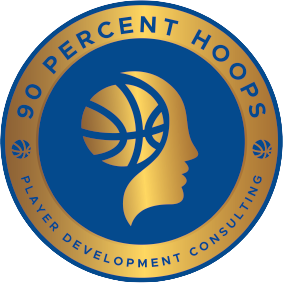Growth mindset has become a buzzword in society, where we hear a lot about it but don’t really understand what it means. Developing the growth mindset is a big step in personal development. We at 90 Percent Hoops believe in personal growth and how that can lead to growth as a player or coach.
The core tenants of the growth mindset
Resistance to complacency: Thinking that we will automatically get better as time goes on is one of the greatest misconceptions that humans have. There has to be intention when it comes to getting better either overall or in something specific. We also cannot live our entire lives off of a success we may have achieved one time. If we want to get good and then stay good, we must constantly be thinking about how we can get better.
Understanding how much control you have: There are many things in life that we have no control over. But we can always control how much effort we give, how we think, and how we react. Our outlook on life often determines the quality of our lives. It’s the same in basketball. If we don’t think highly of ourselves and have confidence in ourselves, then that will not be reflected in our performance. Our outcomes can drastically change just based on our attitude and how much effort we put into it.
You are always becoming: We never arrive. There is no final destination in life. A lot of people have specific goals they want to reach. They think that once they reach those goals, then they will have everything they want. I once heard JJ Redick giving a talk to the Duke basketball team. He talked about how you never arrive, you are always becoming. The growth mindset means we are always in pursuit of being better and doing better in all phases of our lives.
How a growth mindset leads to better performance
Providing feedback is an essential piece of the coach and player relationship. Honest feedback greatly benefits both sides. Players need to know what they’re doing well, how they can continue to improve, and the areas that need to be worked on. Feedback from player’s help coaches understand their players better so they can then in turn, coach them better.
Individuals with a growth mindset are more receptive to feedback and more effectively able to implement that feedback. Being able to take feedback and put it into action increases intrinsic motivation to both learn and perform.
Individuals with a growth mindset are also more receptive to constructive criticism. A significant part of this is because the growth mindset is always looking to improve. Criticism is not seen as a personal attack or indictment of character; it is to help an individual grow and get better. The growth mindset perceives constructive criticism as both helpful and necessary.
Growth mindset also plays a major role in recovery. A growth mindset cannot heal sore muscles or reduce fatigue, but it helps in the mental recovery. Both winning and losing can take a serious toll on the mind. It can lead to a diminished or overly heightened sense of confidence. Having a growth mindset also helps us center our thoughts and be more focused on the process and what’s next.
It has actually been discovered in multiple studies that individuals with a fixed mindset are more likely to avoid constructive feedback that could help them learn and develop, while a growth mindset accepts and pays attention to mistakes and failure because they understand it will inevitably lead to growth.
Instilling a growth mindset also influences commitment. In order to be committed to the goal of the team/organization, every individual has to feel involved and that their contributions matter. There also has to be accountability, every individual has to be held to a certain standard and carry out specific responsibilities. Consistent feedback creates involvement. If there isn’t consistent feedback and only feedback when there is a mistake, it can create insecurity. Insecurity prevents an individual from performing their best.
Building a culture around the growth mindset
Almost every person in the world is driven by incentive in some way. If there is a known reward for performing well at something, then they are going to be more driven and focused in their efforts. In basketball, the incentive is winning and the good feelings that come with it.
There also have to be incentives for developing and getting better. Finding these incentives may require a bit of creativity. No coach is going to guarantee playing time if a player reaches a certain level. It’s important for coaches to help their players understand the value of hard work and pushing yourself to be better. These are values that will help athletes more in life than they will just on the court.
In order to effectively build a culture around growth and development, there has to be complete buy in from everyone involved. Every coach and player have to be held to the same standard and always pushed towards growth and betterment.
It starts with the head coach, or the primary leader then trickles down to assistant coaches and team captains. If those in leadership positions display a growth mindset, then the rest will soon follow. Individuals in growth mindset cultures where learning and growth is highly valued, have actually been shown to have higher levels of trust, collaboration, and empowerment. The growth mindset helps players understand the value of the team and enables them to work together more effectively.
For leaders to build and sustain a culture of growth they should:
- Reward more than just results. Emphasizing the process rather than the outcome. The focus for the team shouldn’t be on achieving a specific result, it should be on continual learning and development. The way to do this is to recognize and provide praise for progress. Consistent progress is what ultimately allows for the desired results to come.
- Rewarding and giving praise to players who make team contributions. The player who hustles for an offensive rebound or dives on the floor should be valued just as much as the player who scores 30 points a game. Players should be rewarded for things that help the team and impact winning and the entire culture.
- Players who show progress and improvement need to be recognized and put in leadership positions. Creating a growth culture starts by having growth minded individuals as the lead examples.
- Creating an environment where everyone works hard and is engaged. This way others don’t feel right and extremely out of place if they are not at that level. I think that comes from holding everyone to a standard, no matter how skilled they are or unskilled they are For coaches, it’s having the mindset of: You are not going to come in here and pull everyone else down or not be held to the same standard because of your status on the team or as an individual. To create total team, buy-in, the best players have to be the most bought in, most involved, and exemplify the growth mindset.
Teams that possess and value the growth mindset have proven to be:
- More inclined to share helpful learning strategies with others. There will be more trust between players and coaches to honestly discuss what is working, what is not, which can greatly improve communication.
- More willing to view a loss or bad performance as an opportunity to get better, rather than a setback. Coaches will be more likely to see it as an opportunity to educate and teach players rather than punish them.
- More focused on their own development rather than comparing themselves to somebody else. Provides more intrinsic motivation where they want to grow and improve for themselves rather than to gain the approval of someone else.
- Not as likely to view others as competition. This may sound a little counterintuitive, but it can far more helpful to focus on your own team instead of the other team. A culture around the growth mindset helps the team focus on themselves instead of worrying about the competition. Adversity and competition is always seen as a challenge. Challenges are seen as an opportunity to grow and get better.
Source for data:
NLI_transform_PM_with_GM_DIGITAL.pdf (hubspot.net)
Check out our last article: https://90percenthoops.com/four-questions-to-determine-how-a-player-should-be-developed/
Follow us on Twitter: https://twitter.com/90percent_hoops
Connect with us on LinkedIn: https://www.linkedin.com/in/jonathan-mcclure-0594aa17b/
eBooks & Courses: https://90percenthoops.com/shop/






